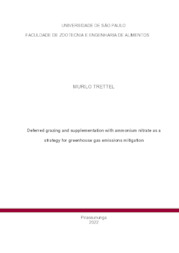Deferred grazing and supplementation with ammonium nitrate as strategy for greenhouse gas emissions mitigation.
Deferred grazing and supplementation with ammonium nitrate as strategy for greenhouse gas emissions mitigation.
Autoria: TRETTEL, M.
Resumo: This experiment evaluated the effects of appropriate pasture management practices and proteic supplementation as strategies to reduce the greenhouse gases emission. 24 Nellore heifers (372 kg in BW and ± 15 months old), 6 animals per treatment, were used. In each treatment, four heifers were used for methane production measurement (SF6 tracer gas technique), and all of them for performance evaluation. The animals were randomly allotted to 8 paddocks in randomized block (terrain location) design during a year (total of three replicates). Treatments were composed by two grazing systems and two nutritional supplement (2x2 factorial): 1) deferred grazing and urea supplementation (DfG+UR), 2) deferred grazing and ammonium nitrate supplementation (DfG+AN), 3) non-deferred grazing and urea supplementation (NDG+UR), and 4) non-deferred grazing and ammonium nitrate supplementation (NDG+AN). The supplements were isoproteic and left at will to the animals. The analyzes were carried on animals performance, supplement intake and GHG emission. Animals showed a difference in methane/animal.day emission between seasons, due to their growth. Regarding the emission of methane/daily weight gain, there was a lower emission for animals in the deferred system in winter. The animals presented methane emission/Gross Energy intake and methane emission / DMI with triple interaction, and in both cases the highest emission was for animals in rotated supplemented with urea during spring, while the gross energy amount spent in methane emissions (Ym%) was higher in animals during spring. This results shows feasibility in intensification of production systems as a reduction in methane emissions per meat produced.
Ano de publicação: 2022
Tipo de publicação: Teses
Unidade: Embrapa Pecuária Sudeste
Palavras-chave: Bovino de corte, Manejo de pastagem, Metano, Proteinado
Observações
1 - Por padrão são exibidas publicações dos últimos 20 anos. Para encontrar publicações mais antigas, configure o filtro ano de publicação, colocando o ano a partir do qual você deseja encontrar publicações. O filtro está na coluna da esquerda na busca acima.
2 - Para ler algumas publicações da Embrapa (apenas as que estão em formato ePub), é necessário ter, no celular ou computador, um desses softwares gratuitos. Sistemas Android: Google Play Livros; IOS: iBooks; Windows e Linux: software Calibre.
Acesse outras publicações
Acesse a Base de Dados da Pesquisa Agropecuária (BDPA) para consultar o acervo completo das bibliotecas da Embrapa.

